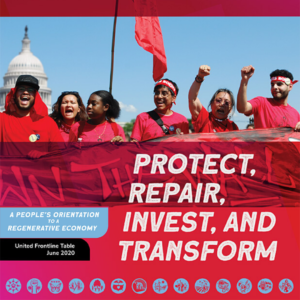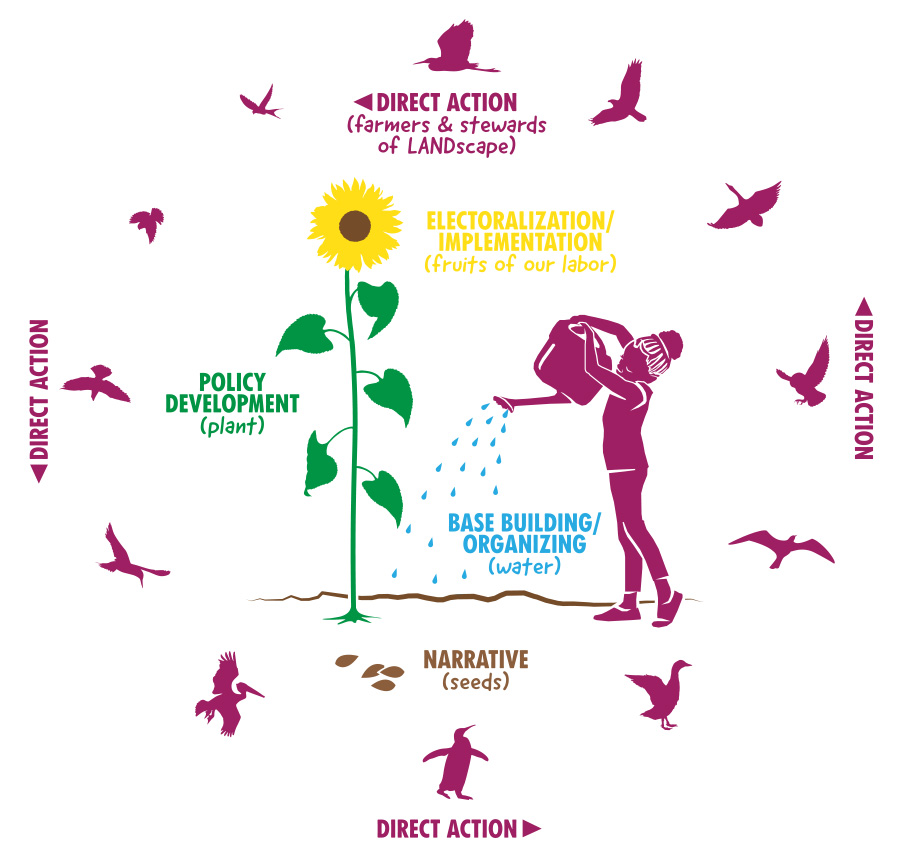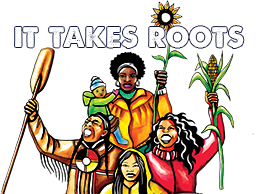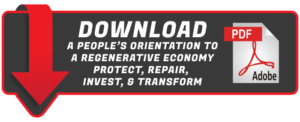Today, a group of sixteen frontline and climate justice organizations from across the U.S. announced the creation of the United Frontline Table, a network comprised of alliances, coalitions, community organizations and their member organizations, that have come together to advance a new economy, based in racial justice, gender equity, jobs, health, and safety for all people; an economy that functions in balance with Mother Earth’s offerings, and with reciprocity, dignity and respect for nature.
At the same time, and in alignment and solidarity with the Movement for Black Lives and the Rising Majority, the United Frontline Table released a tool for policymakers and community organizations, which clearly prioritizes Justice for Black Communities, known as A People’s Orientation to a Regenerative Economy.
“This dynamic tool, which began design last summer when 64 frontline groups joined us in Detroit for the Frontline Green New Deal, Climate and Regenerative Economic Policy Summit, is a critical tool that is uniquely positioned to contribute to justice for black communities, even amid this historic pandemic.” -Darryl Jordan, East Michigan Environmental Action Council
 The tool lays out three steps that can be taken right away to make a down payment on a more just, equitable and frontline centered economy, or a regenerative economy, from the local level up. “Pursuing a Regenerative Economy requires a society committed to anti-racism, and a transformation in how we view and value the lives of Black people.”– A People’s Orientation to a Regenerative Economy.
The tool lays out three steps that can be taken right away to make a down payment on a more just, equitable and frontline centered economy, or a regenerative economy, from the local level up. “Pursuing a Regenerative Economy requires a society committed to anti-racism, and a transformation in how we view and value the lives of Black people.”– A People’s Orientation to a Regenerative Economy.
First, it includes a series of questions that must be well thought out before policy development begins; second, a framework to protect, repair, invest and transform economies so no one is left behind; and finally, eighty policy ideas broken into fourteen planks that lead to a truly transformative, regenerative economy that has been proven to work for frontline communities and workers.
Justice for black communities, one of 14 planks in the tool, is a central policy priority in any regenerative economy. This tool lays out how to begin with a series of concrete recommendations for lawmakers that can be advanced right away:
- End Mass Incarceration & Capital Punishment
- Make Reparations
- Reinstatement of Voting Rights
- Equitable Access to Housing, Jobs, Healthcare & Education
- Invest in Community-Governed Infrastructure
- Build Community Governance & Oversight Over Local Institutions & Economies
- Divest from Extraction & Invest in Our People starting with Defunding & Demilitarizing Police
Communities around the country will use this tool to better inform lawmakers, at all levels of government, and ensure the people are leading the development and implementation of policy in a way that centers frontline needs from the onset.
Policymakers can also utilize it now, and as they are elected in the coming year, to ensure that as we recover and rebuild, we also reimagine and reshape our economy, and do so in sustainable ways that will not reproduce historical harm or enable future social, climate, environmental, or health crises.
Over the next few weeks, the United Frontline Table will spotlight one policy plank per week during what is being coined 14 Weeks of Regeneration.
The United Frontline Table (UFT) is comprised of the following networks, alliances, coalitions, and their members, with the cooperation of movement support organizations: Asian Pacific Environmental Network, Center for Economic Democracy, Climate Justice Alliance, Dēmos, Grassroots Global Justice Alliance, Gulf Coast Center for Law & Policy, Indigenous Environmental Network, It Takes Roots, Kentuckians for the Commonwealth, Labor Network for Sustainability, New Economy Coalition, People’s Action, Right to the City Alliance, The Rising Majority, Trade Unions for Energy Democracy, and UPROSE.

Cassia Herron, Chairperson, Kentuckians for the Commonwealth
“The framing of this report reflects the kind of world we want to live in. It is amazing that even in this moment, people on the frontlines are still leading with vision. It is critically important that people whose blood, sweat, and tears built this nation continue shaping and leading it. To implement this plan, we need a leader-full approach to co-governance, consistent with the inclusive process that went into creating it.”
Indigenous Environmental Network,Tom Goldtooth, Executive Director
“Indigenous Environmental Network remains firm in our commitment to cultivating communities of care and compassion and the release of these policies speak to that. We look forward to working with our communities to ensure these policies move forward and are enacted.”
Emma Lockridge, People’s Action, Environmental Justice Organizer at Michigan United
“The United Frontline Table provides a strategic blueprint that can be utilized to end the systemic oppression that plagues the so-called “marginalized” people in our country.
Centuries of government sanctioned racism has trapped Black people in a spiral of unfulfilled dreams. This year, in 2020, a clear cut vision has been developed to allow people, no matter the color, gender or background, to thrive in a just world that values everyone’s humanity. As we say at Michigan United, it’s time for us to know justice, know peace.”
Grassroots Global Justice Alliance, Rose Brewer, Activist Scholar with Afro-Eco, Minneapolis
“From the white settler colonialism that initiated the state of Minnesota with the genocidal removal of Indigenous peoples to the current period structured in the legacies and ongoing practices of white supremacism, anti-blackness, economic exploitation and extractivism, policing is foundationally central to the logic of racial capitalism. State violence is woven into the very fiber of social control levelled against Black communities/Black bodies in Minneapolis. The George Floyd uprising powerfully expresses that more police are not the answer to the deep structural issues of economic dispossession, racism and state violence. The tip of the spear are the young Black working class and poor who rose up with the clarion call that Black Lives Matter. This call reaches into the very interstices of US society – and the globe. We must recognize and protect our humanity and that of mother earth. We are germinating the seeds of a new society, rooted in a deep vision and practice of a regenerative feminist economy.”
Rodney McKenzie, Jr. , Executive Vice President, Movement Strategies, Dēmos
““To create fundamental and enduring change for Black communities, transformative times need transformative ideas. The Protect, Repair, Invest, & Transform Framework for a Regenerative Economy is a brilliant storehouse and toolkit for young Black leaders fighting on the ground to shut it down, liberate Black communities, and rebuild the whole system in truth and power for people and planet. The United Frontline Table of the Climate Justice Alliance should be commended for the hard, indispensable work and clear vision of its grassroots members, which is captured and shared in this Framework. Demos stands today and every day with such leadership in these transformational times.”
Alternatives for Community & Environment, Dwaign Tyndal, Executive Director
“The Black experience in the United States, since the nation’s inception, has always been rooted in struggle, despair, and trauma. But it’s also rooted in celebration and inexorable contributions through scholarship, arts, organizing, and solutions to the culture of a nation that has dehumanized us for centuries. Today we continue that tradition with the release of the People’s Orientation to a Regenerative Economy, which stipulates that Justice for Black Communities is a prerequisite for any tool to be effective. We’ve known for decades that racial justice and climate justice are not mutually exclusive, they are symbiotic. And with this new tool, we have given the world a blueprint that builds off the wisdom the founders of the climate justice movement have left for us to adapt to the extraordinary and epochal moment we find ourselves in as Black people and collectively.” – Dwaign Tyndal
Lisa Owens, Executive Director City Life / Vida Urbana, member of Right to the City Alliance
“The mass uprisings taking place across the US and internationally in defense of Black lives is a snapshot of what it looks like when people stand in our power and dignity and rise up against oppressive systems. African Americans and African descendant peoples, Indigenous peoples, people of color, immigrants, and working class people are demanding bold, dramatic change now. This historical moment requires that all justice seeking people answer this charge by putting forward a vision for the structural transformation that our communities need. A People’s Orientation to a Regenerative Economy represents a step forward in articulating a vision of a new economy that is life giving, sustainable, and built on the values of many social justice, liberation, and sovereignty movements. “

